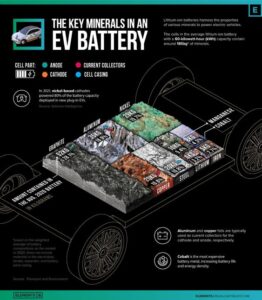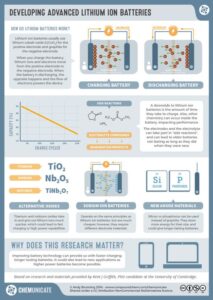Electric Vehicle (EV) batteries are the backbone of modern electric cars, and understanding the technology behind them is essential for anyone interested in green transportation. Lithium-ion batteries are the most common type used in EVs due to their high energy density, rechargeability, and relatively small size. These batteries consist of several key components, including a positive electrode made of lithium cobalt oxide, lithium manganese oxide, or lithium iron phosphate, a negative electrode made of graphite, and an electrolyte solution that allows for the flow of ions. Other materials, such as aluminum, copper, plastic, and steel, are also used for conductivity, insulation, and structural support. Overall, the technology behind EV batteries is constantly evolving, and as it does, we can expect to see even more efficient and powerful electric vehicles on the road in the future.

Main Ingredients Used In EV Batteries:
Lithium compounds:
Lithium is the main ingredient in EV batteries and is typically extracted from lithium ores. Lithium is used to make the positive electrode of the battery.
Cobalt:
Cobalt is used in the cathode of many lithium-ion batteries, as it improves battery performance and extends battery life.
Nickel:
Nickel is used in the cathode of many lithium-ion batteries, as it improves energy density and reduces the risk of overheating.
Graphite:
Graphite is used in the anode of lithium-ion batteries, as it is an excellent conductor of electricity and has a high energy storage capacity.
Aluminum and Copper:
These materials are used for conducting electricity within the battery cells and to connect cells in a battery pack.
Electrolyte solution:
This solution, typically made of lithium salt and an organic solvent, allows for the flow of ions between the electrodes, which is essential for the battery to function.
Overall, the specific ingredients and their ratios can vary depending on the manufacturer and type of battery. However, the main ingredients used in EV batteries are typically some combination of lithium, cobalt, nickel, graphite, aluminum, copper, and an electrolyte solution.

In Brief:
Electric Vehicle (EV) batteries are the power source that propels an electric vehicle. Unlike traditional gasoline-powered vehicles, EVs use rechargeable batteries that store electricity to power an electric motor. Lithium-ion batteries are the most common type of battery used in EVs due to their high energy density and rechargeability.
EV batteries consist of several electrochemical cells that convert chemical energy into electrical energy. Each cell consists of a positive electrode, a negative electrode, and an electrolyte solution, which allows the flow of ions between the electrodes. The positive electrode is typically made of lithium cobalt oxide, lithium manganese oxide, or lithium iron phosphate, while the negative electrode is made of graphite.
Other materials, such as aluminum and copper, are used for conducting electricity, plastic for insulation, and steel for structural support. The battery casing is typically made of aluminum or a composite material to reduce weight.
EV batteries have a limited lifespan and will eventually require replacement. However, advancements in battery technology are continually improving battery performance, reducing costs, and extending battery life. As a result, EVs are becoming increasingly popular as a more environmentally friendly and sustainable mode of transportation.
